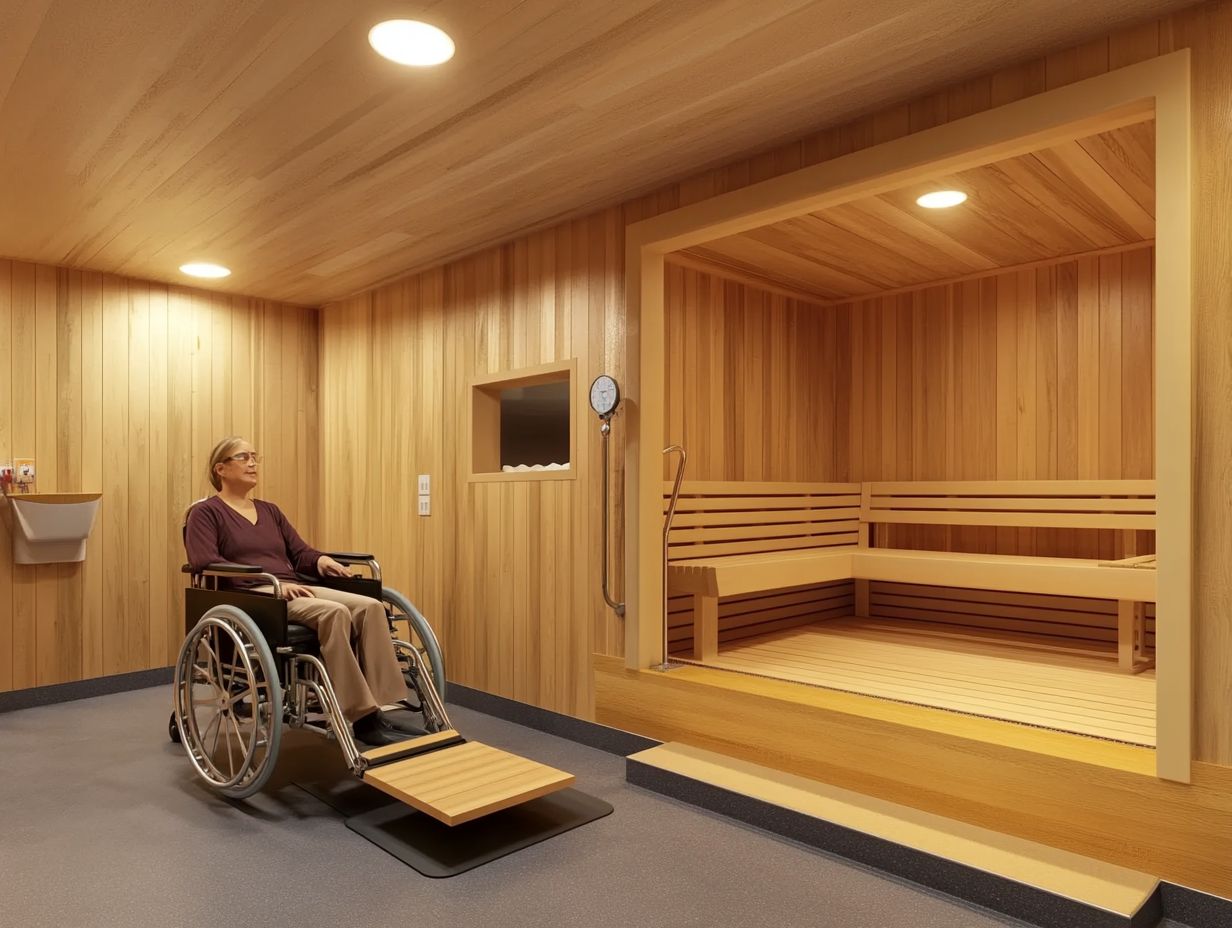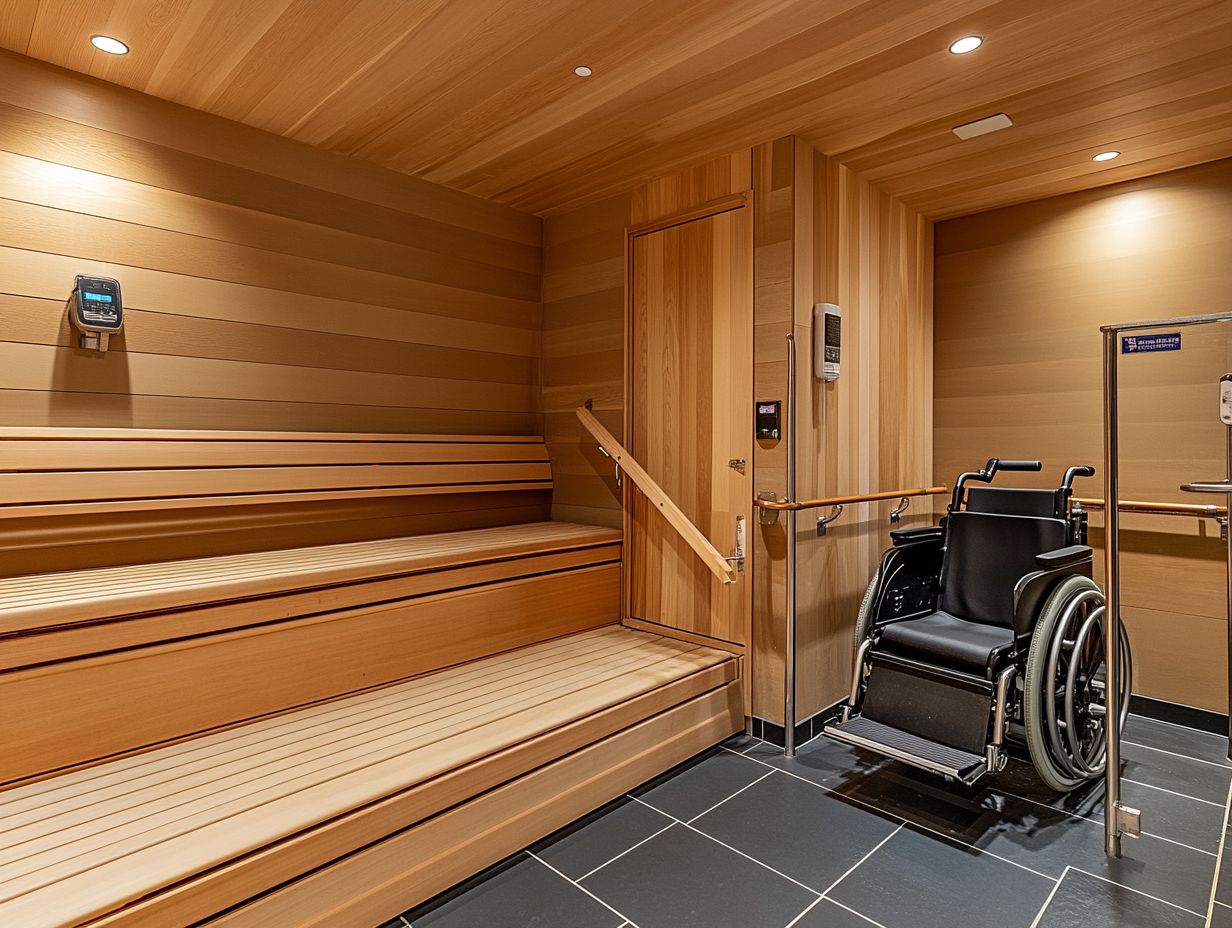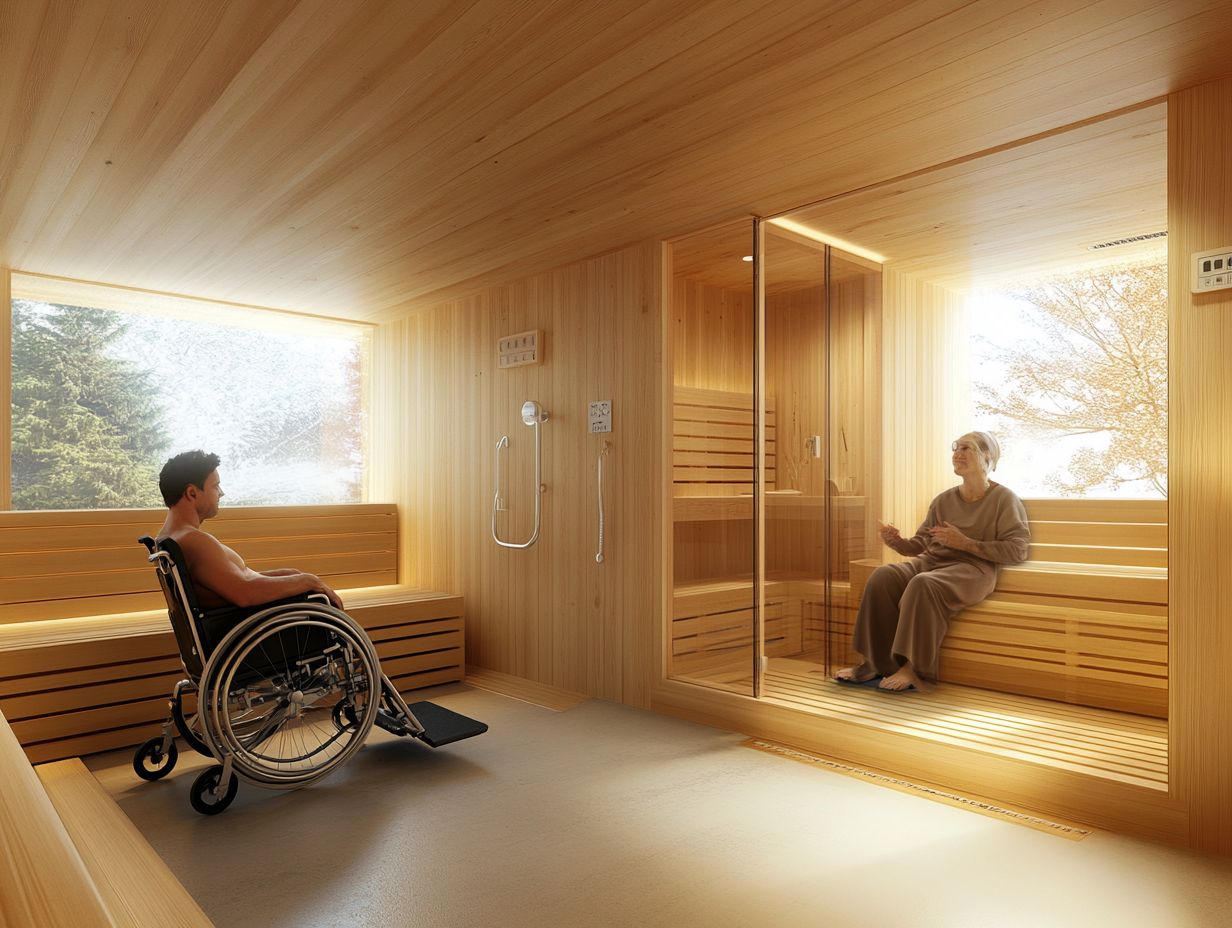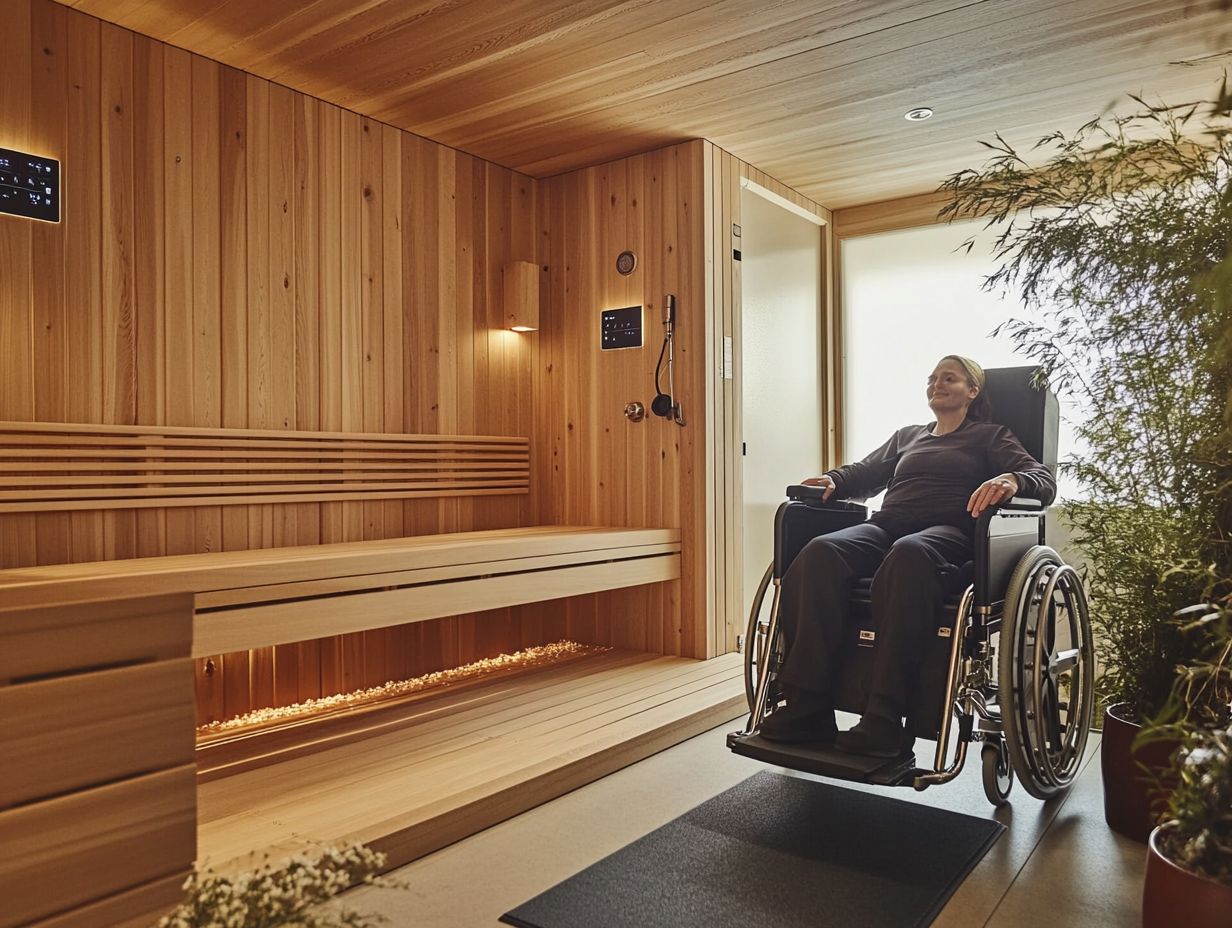Sauna Safety for Individuals with Disabilities
Saunas have long been celebrated for their relaxing and rejuvenating effects. You’ll find their benefits particularly significant if you or someone you know has a disability.
Let s explore the amazing benefits of saunas and how they can change your life! This article highlights the various physical and mental health advantages saunas can offer. It also addresses potential risks and necessary precautions, ensuring you can enjoy a safe experience.
You’ll discover strategies for adapting sauna use to accommodate different disabilities. It’s essential to consult healthcare professionals for personalized guidance.
Whether you’re considering sauna therapy for yourself or for someone you care about, this guide will empower you to navigate the world of sauna use with confidence. Don’t miss out on the incredible benefits saunas can provide for you or your loved ones!
Contents
- Key Takeaways:
- Benefits of Sauna Use for Individuals with Disabilities
- Potential Risks and Precautions
- Adapting Sauna Use for Different Disabilities
- Consulting with a Healthcare Professional
- Frequently Asked Questions
- What is a sauna and how is it beneficial for individuals with disabilities?
- Are there any safety precautions I should take before using a sauna?
- Can individuals with all types of disabilities use a sauna safely?
- What are some potential risks associated with using a sauna for individuals with disabilities?
- What modifications can be made to a sauna for individuals with disabilities?
- Is it safe for individuals with disabilities to use a sauna alone?
Key Takeaways:

- Individuals with disabilities can benefit from sauna use both physically and mentally. Consult with a healthcare professional to assess any potential risks and precautions.
- Adapting sauna use for different disabilities involves strategies such as adjusting temperatures and using assistive devices to ensure a safe and comfortable experience.
- Proper assessment of individual needs is crucial for safe sauna use. Consulting with a healthcare professional can help determine the best approach for each individual.
What is a Sauna and How Does it Work?
A sauna is a compact oasis designed for heat sessions. It utilizes either infrared or traditional methods to promote sweating and relaxation. It’s no wonder these spaces have become a favored retreat for those looking to enhance their wellness journey, addressing detoxification, stress management, and skin health.
These heat-retaining sanctuaries have a rich history, stretching back thousands of years to cultures like the Finns. They used saunas not just for bathing but as essential social hubs. Traditional Finnish saunas employ wood-burning stoves to create high temperatures with low humidity, while steam saunas provide a moist environment that can ease respiratory issues.
On the other hand, infrared saunas work by penetrating the skin at lower temperatures. This boosts metabolic rates that may support weight loss and cardiovascular health. Regular sauna use has also been linked to improved mental wellness. The soothing effects can help alleviate anxiety and foster better sleep patterns. In a world filled with health challenges, saunas present a holistic solution that seamlessly integrates into modern lifestyles.
Benefits of Sauna Use for Individuals with Disabilities
Using a sauna can provide you with a wealth of health benefits, especially if you re an individual living with disabilities like autism or ADHD. It fosters relaxation, alleviates stress, and may enhance your overall mental wellness.
Research from experts such as Dr. Amir Miodovnik indicates that sauna therapy might positively impact neuro-toxicity, which refers to harmful effects on the brain. This might help those with autism spectrum disorders and childhood autism manage their symptoms more effectively. Embracing this practice could be a powerful step toward improving your well-being.
Physical and Mental Health Benefits
The physical and mental health benefits of sauna therapy are well-documented. They offer improvements in immune function, muscle recovery, and stress management. It s no wonder infrared saunas have become a favored choice for enhancing overall well-being.
Beyond just the warmth, saunas promote detoxification through sweating. This helps you eliminate heavy metals and environmental toxins, which can lead to better skin health and improved mental clarity.
For those managing disabilities, sauna therapy can be a helpful treatment, easing symptoms like chronic pain and muscle stiffness. Research shows that regular sauna use can significantly reduce inflammation, making it particularly beneficial for conditions such as arthritis and fibromyalgia.
A study published in the *Journal of Clinical Rheumatology* revealed that participants using saunas experienced remarkable relief from pain and enhanced joint mobility.
Users frequently report increased relaxation and mood stabilization after sessions. This contributes to a richer, more fulfilling daily life. By incorporating sauna therapy into your wellness routine, you may find relief and enhance your overall quality of life, aligning perfectly with the principles of healthy living.
Potential Risks and Precautions

While sauna therapy offers many health benefits, it s crucial to recognize the potential risks and take necessary precautions to ensure safe use especially if you have underlying health conditions or disabilities.
Be aware of risks such as dehydration, overheating, and exposure to harmful environmental toxins like phthalates (chemicals found in plastics) and polychlorinated biphenyls. This awareness calls for well-considered choices and strict adherence to sauna safety guidelines, particularly during ongoing health crises like COVID-19.
Your safety and well-being deserve this level of diligence.
Assessing Individual Needs and Limitations
Assessing your individual needs and limitations is essential before diving into sauna therapy, especially if you have disabilities like ADHD or autism spectrum disorders. These health conditions call for tailored approaches to help you maximize benefits while minimizing risks.
Understanding specific limitations, such as chronic fatigue syndrome or other health issues, will guide you in utilizing sauna therapy effectively for your health management.
Consider factors like your cardiovascular health, skin sensitivity, and any respiratory conditions. These can significantly impact both the effectiveness and safety of sauna use.
For example, if you have asthma, opting for lower temperatures and shorter sessions could help prevent discomfort.
Consulting healthcare professionals who understand disability-related needs can offer valuable insights for crafting a personalized plan. This ensures resources are allocated wisely and helps you avoid any adverse effects.
Taking this individualized approach not only promotes safe practices but also enhances your overall therapeutic experience, making sauna therapy a feasible option for addressing various health concerns.
Adapting Sauna Use for Different Disabilities
Adapting sauna use for individuals with various disabilities requires a thoughtful approach that prioritizes specific needs. This enhances the therapeutic effects of sauna therapy, especially for conditions like autism and ADHD, where muscle recovery and stress management play crucial roles.
By carefully considering factors like sauna types, temperature, duration, and frequency, you can optimize the benefits tailored to different disabilities while ensuring a safe and comfortable experience.
Ready to transform your wellness routine? Talk to your doctor about adding sauna therapy today!
Strategies for Safe and Comfortable Use
Implementing effective strategies for safe and comfortable sauna use is essential, particularly for individuals with autism or ADHD who may be more sensitive to heat and environmental changes. Consider gradual acclimatization to the sauna environment and keep a close eye on your hydration levels. Be mindful of any discomfort that could arise, whether from heavy metals detoxification or other factors related to detoxification.
To elevate your sauna experience, start with shorter sessions maybe just five to ten minutes before gradually extending the duration as your comfort allows.
Pacing your entry and exit is crucial; give your body ample time to adjust to temperature swings.
Utilizing cool-down breaks can be incredibly beneficial. Stepping out for a few moments allows you to regulate your body heat. Embracing mindfulness during your session focusing on your breath and tuning in to your physical sensations can further enhance relaxation while promoting awareness of any signals from your body that might suggest it s time to exit the sauna early.
Consulting with a Healthcare Professional

Consulting with a healthcare professional before embarking on sauna therapy is not just advisable; it s essential, especially for individuals with disabilities who may face underlying health conditions. This step ensures that the practice aligns perfectly with your unique health needs.
Experts like Dr. Amir Miodovnik underscore the necessity of seeking medical advice, allowing you to tailor your sauna experience to maximize benefits while effectively minimizing any potential risks linked to your existing health concerns. Understanding emotional needs is also crucial, as highlighted in the sauna safety guide.
Importance of Medical Advice and Supervision
The significance of seeking medical advice and supervision when considering sauna therapy for conditions like autism, ADHD, or chronic fatigue syndrome cannot be emphasized enough. Tailored guidance from healthcare professionals can greatly enhance both the effectiveness and safety of the therapy.
By engaging with these experts, you ensure that your sauna use aligns with your specific health dynamics and therapeutic needs.
These professionals play a vital role in assessing your physical and mental health status. They help design personalized sauna sessions that cater to your unique challenges. By understanding your specific conditions, they can recommend the ideal duration, temperature, and frequency of sauna therapy.
They re also adept at identifying potential red flags, such as heat intolerance or sensory sensitivities, allowing for necessary adjustments that can enhance your experience.
This thoughtful approach fosters a safer environment and optimizes therapeutic outcomes, making sauna therapy a valuable addition to your holistic wellness journey.
Frequently Asked Questions
What is a sauna and how is it beneficial for individuals with disabilities?
A sauna is a small room or enclosure designed to expose the body to dry heat. It can be beneficial for individuals with disabilities as it helps to relax muscles, reduce pain and inflammation, and increase circulation.
Are there any safety precautions I should take before using a sauna?

Yes, it is important to consult with a doctor before using a sauna, especially if you have a disability. Follow safety guidelines provided by the sauna facility and have a companion present during your sauna session.
Can individuals with all types of disabilities use a sauna safely?
The safety and effectiveness of using a sauna may vary depending on the type and severity of a disability. It is important to consult with a doctor and follow their recommendations before using a sauna.
What are some potential risks associated with using a sauna for individuals with disabilities?
Using a sauna can lead to dehydration, overheating, or worsening certain medical conditions.
Always monitor your body’s response and limit sauna use if you feel any discomfort.
What modifications can be made to a sauna for individuals with disabilities?
Modifications can include handrails for support and ramps for wheelchair access.
You should also adjust the temperature and time in the sauna.
Always communicate with the sauna facility about any needed changes.
Is it safe for individuals with disabilities to use a sauna alone?
No, individuals with disabilities should not use a sauna alone.
Having a companion present is crucial for safety and support.






